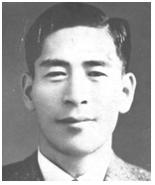Name: admin
2013-12-26 15:51:26 | Hit 2100
Files :  Kim Gyeong-do.docx
Kim Gyeong-do.docx
 Kim Gyeong-do.docx
Kim Gyeong-do.docx
Abductee: Kim Gyeong-do
Recorded Date: October 12th, 2005
Profile of Abductee
Name: Kim Gyeong-do (male)
Date of Birth: April 7, 1905
Place of Birth: Hamyang, Gyeongsangnam-do, South Korea
Last Address: Samcheong-dong Jongno-gu, Seoul, South Korea
Date of Abduction: July, 1950(age 45)
Place of Abduction: Home
Occupation: Former head of Hamyang, member of the Constituent Assembly
Dependents: Wife, 2 sons, 1 daughter
Profile of Witness
Name: Kim Jae-gwan (born in 1943)
Relation: Second son
Type of Witness: Indirect witness
Summary of Abduction
- After many years of teaching career, the abductee was selected as the head of his home town, Hamyang. After Korea was liberated from the Japanese Colonial Rule, he became a member of the Constituent Assembly. He continued his political career and ran for the second National Assembly. Unfortunately, he lost the election. However, to continue his political life, he stayed in his friend’s house in Samcheong-dong, Seoul.
- After the Korean War broke out, the abductee hid in his friend’s house. However, knowing that the abductee was a member of the Constituent Assembly, local leftists tracked him down and arrested him.
- A media source confirmed that the abductee was alive in the North. According to the source, he worked as a central committee member of the Committee for the Peaceful Reunification of the Fatherland and was later sent to a coal mine. No news since then.
Detail of the Abduction
Q. What did your father do for a living at the time of abduction?
My father graduated Chinju National University of Education and taught students for a long time. Then, he was appointed as the head of his hometown, Hamyang and started his political life. In 1945 when Korea was liberated, he was elected as a member of the Constituent Assembly and for two years, he served his post in Seoul. He ran for the second National Assembly, but unfortunately, he lost the election.
He stayed in Seoul, not coming back home in Hamyang where the rest of his family was. In 1950 when the Korean War broke out, he was still in Seoul, living in his friend’s apartment in Samcheong-dong, very close to the Blue House(the Korean presidential residence).
Q. How was he abducted?
My uncle was my father’s secretary. He was with my father until the last minute. But then my uncle took the last train back home, while my father decided to stay in Seoul for his political life, thinking that nothing would happen to him. Kim Hyo-seok, who was then Minister of Home Affairs and was abducted to the North with my father was a close friend of his. They both grew up in Hapcheon, Gyeongsangnam-do.
He offered my father a job as a governor of Gangwon-do, to which my father turned down. Then, he asked my father if he wanted to work as the Vice Minister of Home Affairs, for which he had to wait. My father was pleased with the offer and decided to stay in Seoul until his nomination day. He did not know that the North Korean Army and especially, local leftists were trying to track him down. The leftists knew every piece of information on all members of the National Assembly in Seoul. They obviously knew who my father was.
One day, as my father was walking the street, someone approached him and asked for his identity card. My father showed his ID card, not knowing what the consequence would be. Two or three days later, local leftists came to look for him and took him with them. We heard this story from my father’s friend who shared his apartment with my father. He came to Hamyang after the Korean War ended and told us what happened to my father.
Reason behind the Abduction
Q. Why do you think he was abducted?
Many members of the Constituent Assembly were advocates of nationalism. North Korea probably abducted them with a political purpose to use them to boost North Korean nationalism.
News after the Abduction
Q. Any news after the abduction?
In 1962, Dong-A Daily published a series on abductees called “Days of Death.” I found my father’s name in the publication. It confirmed that my father had been taken to the North. It also showed in detail how difficult my father’s life was in the North and how miserable he was in a coal mine.
Although heartbreaking, I was relieved to find out that my father was still alive. I found another piece of information on my father in the North Korean yearbook, which was published in 1970. I heard from someone that my father worked as a central committee member of the Committee for the Peaceful Reunification of the Fatherland. So I figured out if that were true, he would be on the yearbook. Surely, I was able to find him. It said that my father worked in the Committee for the Peaceful Reunification of the Fatherland, but was later sent to a coal mine.
The last time I heard about my father was February, 1980. My brother was planning to go to the United States, but for some reason, his passport was not issued. He went to the Central Intelligence Agency to see what was going on. There, he found out that my father was still alive in North Korea. So I know for sure that my father was still alive until 1980.
Recorded Date: October 12th, 2005
Profile of Abductee
Name: Kim Gyeong-do (male)
Date of Birth: April 7, 1905
Place of Birth: Hamyang, Gyeongsangnam-do, South Korea
Last Address: Samcheong-dong Jongno-gu, Seoul, South Korea
Date of Abduction: July, 1950(age 45)
Place of Abduction: Home
Occupation: Former head of Hamyang, member of the Constituent Assembly
Dependents: Wife, 2 sons, 1 daughter
Profile of Witness
Name: Kim Jae-gwan (born in 1943)
Relation: Second son
Type of Witness: Indirect witness
Summary of Abduction
- After many years of teaching career, the abductee was selected as the head of his home town, Hamyang. After Korea was liberated from the Japanese Colonial Rule, he became a member of the Constituent Assembly. He continued his political career and ran for the second National Assembly. Unfortunately, he lost the election. However, to continue his political life, he stayed in his friend’s house in Samcheong-dong, Seoul.
- After the Korean War broke out, the abductee hid in his friend’s house. However, knowing that the abductee was a member of the Constituent Assembly, local leftists tracked him down and arrested him.
- A media source confirmed that the abductee was alive in the North. According to the source, he worked as a central committee member of the Committee for the Peaceful Reunification of the Fatherland and was later sent to a coal mine. No news since then.
Detail of the Abduction
Q. What did your father do for a living at the time of abduction?
My father graduated Chinju National University of Education and taught students for a long time. Then, he was appointed as the head of his hometown, Hamyang and started his political life. In 1945 when Korea was liberated, he was elected as a member of the Constituent Assembly and for two years, he served his post in Seoul. He ran for the second National Assembly, but unfortunately, he lost the election.
He stayed in Seoul, not coming back home in Hamyang where the rest of his family was. In 1950 when the Korean War broke out, he was still in Seoul, living in his friend’s apartment in Samcheong-dong, very close to the Blue House(the Korean presidential residence).
Q. How was he abducted?
My uncle was my father’s secretary. He was with my father until the last minute. But then my uncle took the last train back home, while my father decided to stay in Seoul for his political life, thinking that nothing would happen to him. Kim Hyo-seok, who was then Minister of Home Affairs and was abducted to the North with my father was a close friend of his. They both grew up in Hapcheon, Gyeongsangnam-do.
He offered my father a job as a governor of Gangwon-do, to which my father turned down. Then, he asked my father if he wanted to work as the Vice Minister of Home Affairs, for which he had to wait. My father was pleased with the offer and decided to stay in Seoul until his nomination day. He did not know that the North Korean Army and especially, local leftists were trying to track him down. The leftists knew every piece of information on all members of the National Assembly in Seoul. They obviously knew who my father was.
One day, as my father was walking the street, someone approached him and asked for his identity card. My father showed his ID card, not knowing what the consequence would be. Two or three days later, local leftists came to look for him and took him with them. We heard this story from my father’s friend who shared his apartment with my father. He came to Hamyang after the Korean War ended and told us what happened to my father.
Reason behind the Abduction
Q. Why do you think he was abducted?
Many members of the Constituent Assembly were advocates of nationalism. North Korea probably abducted them with a political purpose to use them to boost North Korean nationalism.
News after the Abduction
Q. Any news after the abduction?
In 1962, Dong-A Daily published a series on abductees called “Days of Death.” I found my father’s name in the publication. It confirmed that my father had been taken to the North. It also showed in detail how difficult my father’s life was in the North and how miserable he was in a coal mine.
Although heartbreaking, I was relieved to find out that my father was still alive. I found another piece of information on my father in the North Korean yearbook, which was published in 1970. I heard from someone that my father worked as a central committee member of the Committee for the Peaceful Reunification of the Fatherland. So I figured out if that were true, he would be on the yearbook. Surely, I was able to find him. It said that my father worked in the Committee for the Peaceful Reunification of the Fatherland, but was later sent to a coal mine.
The last time I heard about my father was February, 1980. My brother was planning to go to the United States, but for some reason, his passport was not issued. He went to the Central Intelligence Agency to see what was going on. There, he found out that my father was still alive in North Korea. So I know for sure that my father was still alive until 1980.
No |
Title |
Name |
Date |
Hit |
|---|---|---|---|---|
| 42 | Yun Tae-kyong |
admin |
13-12-26 | 2319 |
| 41 | Lee Ju-sin |
admin |
13-12-26 | 1957 |
| 40 | Son Hae-kyeong |
admin |
13-12-26 | 6968 |
| 39 | Seo Seung-kun |
admin |
13-12-26 | 2254 |
| 38 | Seo Byeong-ho |
adimn |
13-12-26 | 2452 |
| 37 | Park Sung-woo |
admin |
13-12-26 | 2005 |
| 36 | Park Hyon-Myong |
admin |
13-12-26 | 2203 |
| 35 | Lee Seong-hwan |
admin |
13-12-26 | 2418 |
| 34 | Lee In-hyeon |
admin |
13-12-26 | 1961 |
| 33 | Lee Hyung-ho |
admin |
13-12-26 | 16358 |
| 32 | Lee Gyu-chan |
admin |
13-12-26 | 2290 |
| 31 | Lee Gwang-soo |
admin |
13-12-26 | 2460 |
| 30 | Lee Gil-yong |
admin |
13-12-26 | 2143 |
| 29 | Lee Chae-deok |
admin |
13-12-26 | 16242 |
| 28 | Lee Bong-woo |
admin |
13-12-26 | 3289 |
| 27 | Kwon Tae-sul |
admin |
13-12-26 | 2511 |
| 26 | Kim Yu-yon |
admin |
13-12-26 | 2844 |
| 25 | Kim Ki-Jeong |
admin |
13-12-26 | 2405 |
| 24 | Kim Jae-bong |
admin |
13-12-26 | 2147 |
| 23 | Kim Gyeong-do |
admin |
13-12-26 | 2099 |






















 FAX : (82)31-930-6099
FAX : (82)31-930-6099
